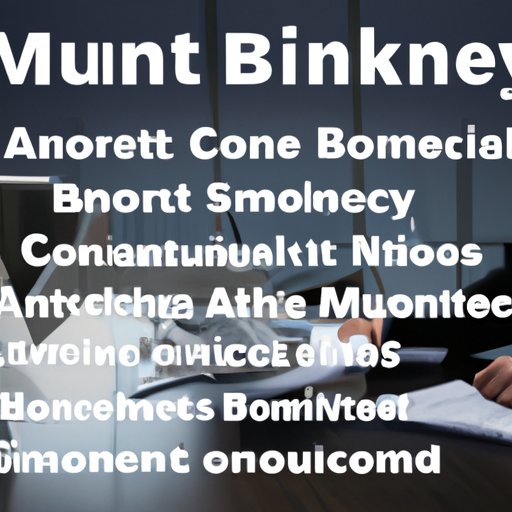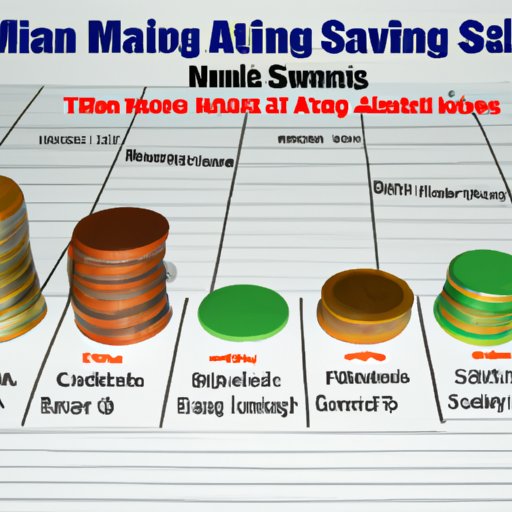Introduction
A business money market account is a type of savings account that allows businesses to earn higher interest rates on their deposits. It is similar to other types of savings accounts, but it typically comes with higher minimum balance requirements and more restrictions on withdrawals. Businesses can use the funds in a business money market account to cover short-term expenses, such as payroll or inventory costs. In this article, we’ll explore the benefits, risks and tips for choosing the right business money market account.

Benefits of Having a Business Money Market Account
Business money market accounts offer several advantages over other types of savings accounts. Here are some of the key benefits of having a business money market account:
Higher Interest Rates
Business money market accounts typically pay higher interest rates than traditional savings accounts. According to Bankrate, the average interest rate for business money market accounts is 0.07%, compared to 0.05% for traditional savings accounts. This difference may seem small, but it can add up over time and provide a significant boost to your business’s bottom line.
Liquidity
Unlike some other investment options, such as certificates of deposit (CDs), business money market accounts are highly liquid. This means that you can easily access the funds in your account when you need them. This can be especially beneficial if you need to cover unexpected expenses or make an emergency purchase.
Accessibility
Business money market accounts are usually accessible through online banking platforms. This makes it easy to monitor your account activity, transfer funds and manage your finances from anywhere. Additionally, many business money market accounts come with mobile apps that allow you to manage your account on the go.
FDIC Insurance
Like traditional savings accounts, most business money market accounts are insured by the Federal Deposit Insurance Corporation (FDIC). This means that if the bank fails, your deposits will be protected up to a certain amount. Generally, the FDIC insures deposits up to $250,000 per depositor per bank.

Comparing a Business Money Market Account to Other Savings Accounts
When deciding whether to open a business money market account or another type of savings account, it’s important to understand the differences between them. Here’s a quick overview of how business money market accounts compare to other types of savings accounts:
Traditional Savings Accounts
Traditional savings accounts are the most basic type of savings account. They typically have low minimum balance requirements and no restrictions on withdrawals. However, they also tend to offer lower interest rates than business money market accounts. If you need easy access to your funds and don’t plan on keeping a large balance in the account, a traditional savings account may be a better option.
Certificates of Deposit
Certificates of deposit (CDs) are a type of savings account that requires you to keep your money in the account for a fixed period of time. In exchange for locking up your funds, you can earn higher interest rates than with a traditional savings account. However, CDs usually come with early withdrawal penalties, so they may not be the best choice if you need quick access to your funds.
Money Market Mutual Funds
Money market mutual funds are a type of investment product that invests in short-term debt securities. They typically offer higher yields than traditional savings accounts, but they also come with higher risk. Unlike business money market accounts, money market mutual funds are not FDIC insured, so your money is not protected if the fund loses value.

Examining the Risks of Investing in a Business Money Market Account
As with any type of investment, there are risks associated with investing in a business money market account. Here are two of the key risks to consider:
Interest Rate Risk
The interest rate on your business money market account can change over time. If the interest rate drops, your returns may decrease. This can be especially problematic if you’re relying on the interest income to cover your business’s expenses.
Liquidity Risk
Business money market accounts come with restrictions on withdrawals, which can limit your ability to access your funds when you need them. Additionally, some banks may impose fees for making too many withdrawals or keeping your balance below a certain level. Be sure to read the terms and conditions of your account carefully before signing up.
Tips for Choosing the Right Business Money Market Account
When selecting a business money market account, it’s important to consider your needs and do your research. Here are a few tips to help you choose the right account:
Research Fees and Interest Rates
Different banks will offer different fees and interest rates for their business money market accounts. Be sure to shop around and compare the fees and interest rates offered by different banks. Also, be aware of any hidden fees, such as maintenance fees or withdrawal fees.
Consider Your Liquidity Needs
Before opening a business money market account, think about how often you’ll need to access the funds in the account. If you need quick access to your money, a traditional savings account or a CD may be a better option.
Check on FDIC Insurance
It’s important to make sure that your business money market account is FDIC insured. This will ensure that your deposits are protected if the bank fails. You can check the FDIC website to verify that the bank is FDIC insured.
Conclusion
Business money market accounts offer several advantages over other types of savings accounts, including higher interest rates, liquidity and FDIC insurance. However, there are also risks associated with these accounts, such as interest rate risk and liquidity risk. To ensure that you select the right account for your business, it’s important to do your research and compare fees and interest rates. By taking the time to find the right account, you can maximize your returns and protect your deposits.
(Note: Is this article not meeting your expectations? Do you have knowledge or insights to share? Unlock new opportunities and expand your reach by joining our authors team. Click Registration to join us and share your expertise with our readers.)
